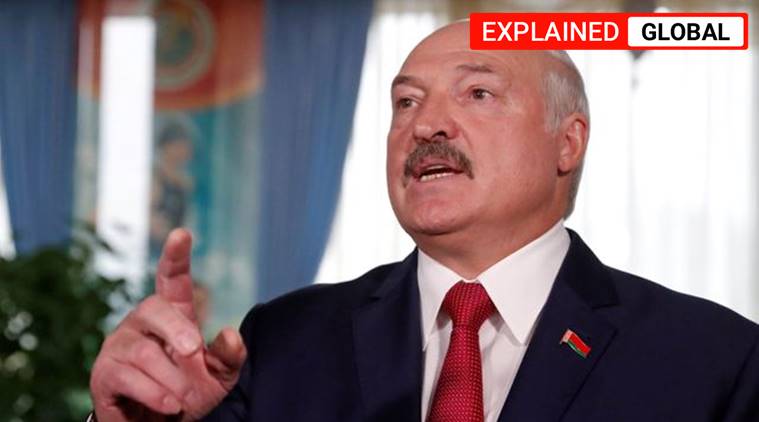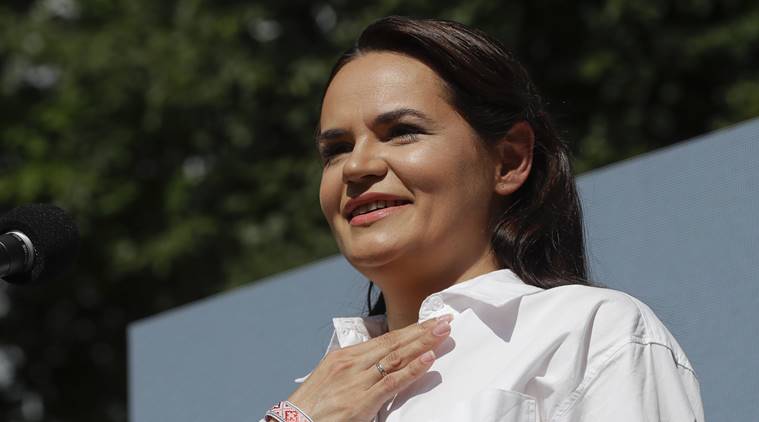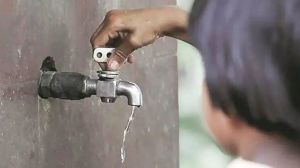Explained: Why Alexander Lukashenko will have to fight harder to retain Belarus this time
Tikhanovskaya is just one of Lukashenko’s worries. Since May, Belarus has witnessed large-scale protests against his presidency with demands for free and fair elections and the release of political prisoners.
 Belarusian President Alexander Lukashenko addresses the media in Minsk, Belarus. (Reuters)
Belarusian President Alexander Lukashenko addresses the media in Minsk, Belarus. (Reuters)
Alexander Lukashenko, the president of Belarus who has been in power since 1994, is now facing an unexpected opponent in the country’s presidential elections this week. Svetlana Tikhanovskaya, a teacher and political neophyte, is hoping end what many observers call an authoritarian government, one that has lasted nearly three decades since soon after the dissolution of the Soviet Union in 1990.
Tikhanovskaya is just one of Lukashenko’s worries. Since May, Belarus has witnessed large-scale protests against his presidency with demands for free and fair elections and the release of political prisoners.
Who is opposing President Lukashenko in Belarus’s elections?
Svetlana Tikhanovskaya, 38, decided to take on Lukashenko in the upcoming presidential elections after her husband Sergei Tikhanovsky, a popular YouTuber, was arrested and prevented from registering as a presidential candidate in May, on grounds that he was instigating protests against the president.
However, the run-up to these elections has been unusual even before Tikhanovskaya came into the picture. The original contenders were Sergei Tikhanovsky, banker Viktor Babaryko and former diplomat Valery Tsepkalo. Observers believe these presidential candidates attracted large crowds during their campaign rallies over the past few months in a large part due to the public’s dissatisfaction at Lukashenko’s mishandling of the COVID-19 pandemic.
 Candidate for the presidential elections Svetlana Tikhanovskaya speaks during a meeting of her supporters in the town of Baranovichi, 150 km (93 miles) southwest of Minsk Belarus, Sunday. The presidential election in Belarus is scheduled for Aug. 9, 2020. (AP Photo/Sergei Grits)
Candidate for the presidential elections Svetlana Tikhanovskaya speaks during a meeting of her supporters in the town of Baranovichi, 150 km (93 miles) southwest of Minsk Belarus, Sunday. The presidential election in Belarus is scheduled for Aug. 9, 2020. (AP Photo/Sergei Grits)
Public sentiments intensified after Tikhanovsky and Babaryko were arrested and disqualified from the race. Observers say Tsepkalo fled to Russia a few weeks ago fearing he would be arrested and implicated on false charges. Local news reporters suggested that Tikhanovskaya had sent her children overseas after receiving threats that they would be taken away from her.
After Tikhanovskaya took up the baton following her husband’s arrest, the campaign teams behind Babaryko and Tsekalpo decided to merge their own campaigns and rally behind her, with the wives of Babaryko and Tsepkalpo helming the front. The team of these three women say they are advocating peacefully for political change in Belarus, a message that appears to have been popular with the country’s citizens. In the last week of July, Tikhanovskaya’s campaign rally resulted in a crowd of thousands, with some observers calling it among the largest anti-Lukashenko rallies in the past decade.
What has Lukashenko’s rule looked like?
Lukashenko has served five terms as president of Belarus since 1994, but observers have questioned the legitimacy of these elections and whether they could be considered free and fair. Like several other authoritarian populist leaders, researchers say Lukashenko has tried to project himself as a “man of the people”. However, his economic policies have added to the country’s problems and unemployment has been on the rise for the past decade. The Belarusian ruble has also experienced devaluation several times. Lukashenko’s critics have also accused him of implementing his authoritarian ideology through the country’s political and economic system.
Most recently, however, his mishandling of the coronavirus since it was first detected in the country in the last week of February and forcing people to continue working in agricultural fields and factories by claiming that work would “heal”, has angered the citizens of Belarus. After the outbreak of COVID-19, Lukashenko prescribed attending hockey matches, vodka, and banya, a traditional sauna, as “cures” for the infection. Despite WHO guidelines recommending physical distancing, Lukasheko encouraged bars, restaurants and other establishments to remain open and for ice hockey matches to continue.
📣 Express Explained is now on Telegram. Click here to join our channel (@ieexplained) and stay updated with the latest
Observers said that on the contrary, there were no clear nation-wide plans to combat the spread of infections as was being witnessed in the other countries around the world and there were reports by independent journalists and analysts that Lukasheko’s government may have been falsifying infection numbers and deaths due to COVID-19. Doctors and journalists who were questioning the official statistics with regard to Belarus’ handling of COVID-19 were either dismissed from their employment or arrested.
Has Russia played a role in Belarus’ elections?
For a significant part of his rule, Lukashenko has relied on Russia’s support, in addition to his country’s geographical proximity and shared borders. However, during political campaigns for this election, observers say Lukashenko has been trying to project himself as a leader devoid of Russian control. Last week, however, Belarusian police detained 33 Russians, accusing them of being mercenaries from a private military company who had been attempting to “destabilise” the country by working with Lukasheko’s opponent Tikhanovsky in the elections.
Russia denied these allegations, saying the men were merely traveling onwards to Turkey and later demanded that the men be released. In a televised address to the nation, Lukashenko said: “All this about Istanbul, Venezuela, Africa and Libya—it’s a lie. These people—they have already given testimony—were sent into Belarus on purpose. The order was to wait.”
What is likely to happen in Belarus?
The likelihood of free and fair elections in Belarus is low but observers believe that Lukashenko will do everything possible to hold on to his power. There are also concerns that he may use political powers to manipulate the election process and may even use force against protestors if such a situation arises.
The past three decades have made clear that Lukasheko cares little for international condemnation or of his image outside his country. The votes from this election will be counted on August 9.
- 01
- 02
- 03
- 04
- 05






































